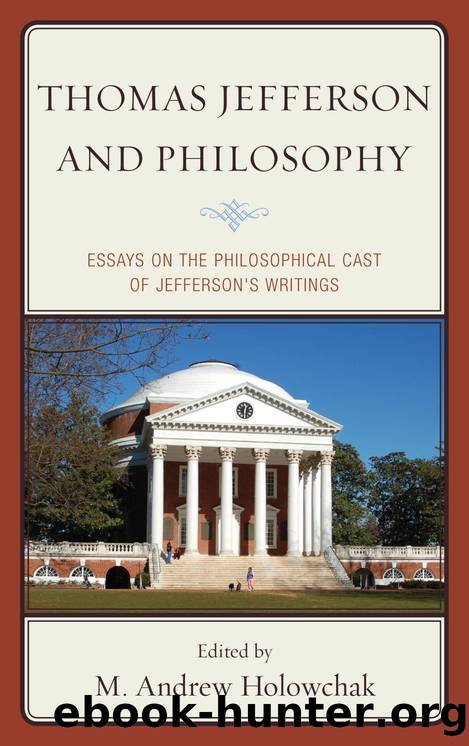Thomas Jefferson and Philosophy by unknow

Author:unknow
Language: eng
Format: epub
Tags: undefined
Publisher: Lexington Books
Published: 2012-08-15T00:00:00+00:00
In this conflicted passage are contained almost all the elements of Jeffersonâs understanding of the problem of slavery during the immediate post-revolutionary period. The principal issues he does not reach are slave trade abolition and the question of the territorial expansion of slavery, but neither relates directly to the gradual emancipation amendment that was never moved. In this passage there is acknowledgment that slavery is unjustâfar more unjust in fact than the imperial tax regime against which the American revolutionaries complainedâand, perhaps less typically, recognition not just of American guilt, but of American agency (the latter expressed in the form of the verb âinflictâ). There is recognition that no legislative majority for emancipation currently exists in Virginia, and, implicitly, that emancipation without majority electoral consent is not feasible or, perhaps, even desirable. There is also the assertion, not implausibleâthink of the proslavery petitionersâ response to the Manumission Law mentioned previouslyâbut not explained, that a failed emancipation measure would tighten slaveryâs hold on the Commonwealth. And finally, there is assurance that slavery will one day end, either because the God of the Enlightenment opens the hearts of the slaveholders or because the God of Revelation and the Old Testament would intervene against them and on behalf of the enslaved, should the slaveholders chose to remain deaf to the commands of justice. An odd marriage of detached reflection and jeremiad, Jeffersonâs proposed encyclopaedic insertion may be counterintuitive in many respects, but it is wholly consistent with everything else he said on slavery during this period. It acquires more credence still when we reflect that Jefferson may have been striving for rhetorical effect, but was not likely posturing for reputationâs sake. Had antislavery image-building been his purpose, he could easily have accepted Démeunierâs original entry, and painlessly retained credit for the moral uprightness of an amendment that was never moved. Instead, he comes very close to accepting that he could not have moved the amendment even if he been on the scene himself; in the court of world opinion, this amounts to a confession against interest, a form of testimony given great weight in the law of evidence for its presumed tendency to truthfulness.
William Freehling has attached the label âconditional terminationâ to Jeffersonâs stance on emancipation, and, more broadly, has called conditional terminators upper Southern leaders from the revolutionary through the ante-bellum periods who announced their willingness to accept the end of slavery in their states when certain conditions were met, the principal of which was state consent.[52] Freehlingâs label fits perfectly. He used it to telling effect to develop his thesis that there were from independence onwards effectively two Souths: a lower South wedded to slavery and an upper South whose commitment to the institution the lower South never trusted. In Eugene Genoveseâs language, what was at issue was the hemispheric future of slavery. The lower South was dedicated to slaveryâs survival, the upper South was (or at least its progressive leaders were) unsure, indifferent, or cautiously disinclined. This, the lower South found profoundly frightening.
Download
This site does not store any files on its server. We only index and link to content provided by other sites. Please contact the content providers to delete copyright contents if any and email us, we'll remove relevant links or contents immediately.
The remains of the day by Kazuo Ishiguro(8999)
Tools of Titans by Timothy Ferriss(8396)
Giovanni's Room by James Baldwin(7346)
The Black Swan by Nassim Nicholas Taleb(7129)
Inner Engineering: A Yogi's Guide to Joy by Sadhguru(6794)
The Way of Zen by Alan W. Watts(6614)
The Power of Now: A Guide to Spiritual Enlightenment by Eckhart Tolle(5781)
Asking the Right Questions: A Guide to Critical Thinking by M. Neil Browne & Stuart M. Keeley(5775)
The Six Wives Of Henry VIII (WOMEN IN HISTORY) by Fraser Antonia(5515)
Astrophysics for People in a Hurry by Neil DeGrasse Tyson(5189)
Housekeeping by Marilynne Robinson(4447)
12 Rules for Life by Jordan B. Peterson(4304)
Ikigai by Héctor García & Francesc Miralles(4274)
Double Down (Diary of a Wimpy Kid Book 11) by Jeff Kinney(4272)
The Ethical Slut by Janet W. Hardy(4253)
Skin in the Game by Nassim Nicholas Taleb(4248)
The Art of Happiness by The Dalai Lama(4130)
Skin in the Game: Hidden Asymmetries in Daily Life by Nassim Nicholas Taleb(4006)
Walking by Henry David Thoreau(3962)
